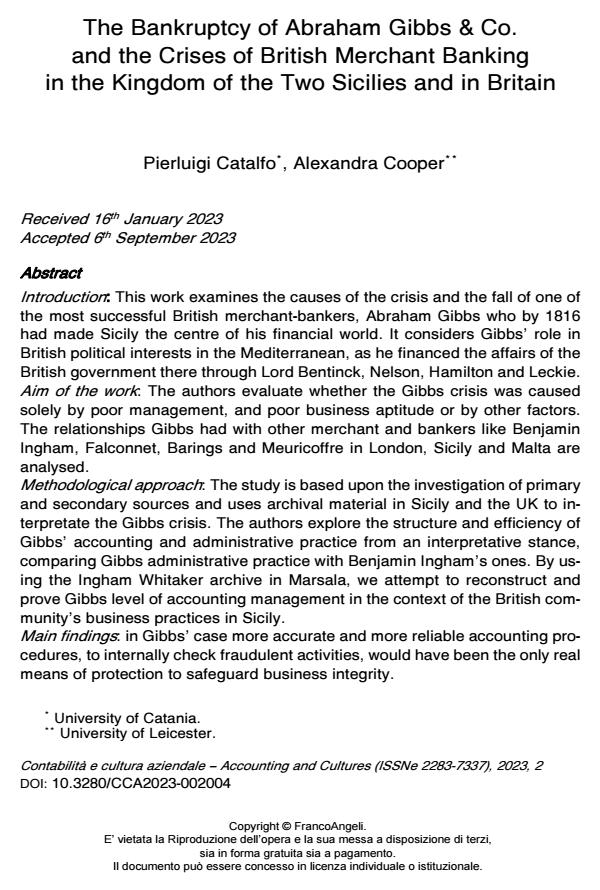The Bankruptcy of Abraham Gibbs & Co. and the Crises of British Merchant Banking in the Kingdom of the Two Sicilies and in Britain
Titolo Rivista CONTABILITÀ E CULTURA AZIENDALE
Autori/Curatori Pierluigi Catalfo, Alexandra Cooper
Anno di pubblicazione 2024 Fascicolo 2023/2
Lingua Inglese Numero pagine 23 P. 63-85 Dimensione file 595 KB
DOI 10.3280/CCA2023-002004
Il DOI è il codice a barre della proprietà intellettuale: per saperne di più
clicca qui
Qui sotto puoi vedere in anteprima la prima pagina di questo articolo.
Se questo articolo ti interessa, lo puoi acquistare (e scaricare in formato pdf) seguendo le facili indicazioni per acquistare il download credit. Acquista Download Credits per scaricare questo Articolo in formato PDF

FrancoAngeli è membro della Publishers International Linking Association, Inc (PILA)associazione indipendente e non profit per facilitare (attraverso i servizi tecnologici implementati da CrossRef.org) l’accesso degli studiosi ai contenuti digitali nelle pubblicazioni professionali e scientifiche
Introduction: This work examines the causes of the crisis and the fall of one of the most successful British merchant-bankers, Abraham Gibbs who by 1816 had made Sicily the centre of his financial world. It considers Gibbs’ role in British political interests in the Mediterranean, as he financed the affairs of the British government there through Lord Bentinck, Nelson, Hamilton and Leckie. Aim of the work: The authors evaluate whether the Gibbs crisis was caused solely by poor management, and poor business aptitude or by other factors. The relationships Gibbs had with other merchant and bankers like Benjamin Ingham, Falconnet, Barings and Meuricoffre in London, Sicily and Malta are analysed. Methodological approach: The study is based upon the investigation of primary and secondary sources and uses archival material in Sicily and the UK to interpretate the Gibbs crisis. The authors explore the structure and efficiency of Gibbs’ accounting and administrative practice from an interpretative stance, comparing Gibbs administrative practice with Benjamin Ingham’s ones. By using the Ingham Whitaker archive in Marsala, we attempt to reconstruct and prove Gibbs level of accounting management in the context of the British community’s business practices in Sicily. Main findings: in Gibbs’ case more accurate and more reliable accounting pro- cedures, to internally check fraudulent activities, would have been the only real means of protection to safeguard business integrity. Originality: the work offers original information to improve knowledge on a specific and interesting period of the history of both Britain and the Kingdom of the Two Sicilies and the interaction between British and Sicilian economies.
Parole chiave:financial crisis, management and accounting practices, bankruptcy, political relations, British business community, Kingdom of the Two Sicilies
Pierluigi Catalfo, Alexandra Cooper, The Bankruptcy of Abraham Gibbs & Co. and the Crises of British Merchant Banking in the Kingdom of the Two Sicilies and in Britain in "CONTABILITÀ E CULTURA AZIENDALE" 2/2023, pp 63-85, DOI: 10.3280/CCA2023-002004